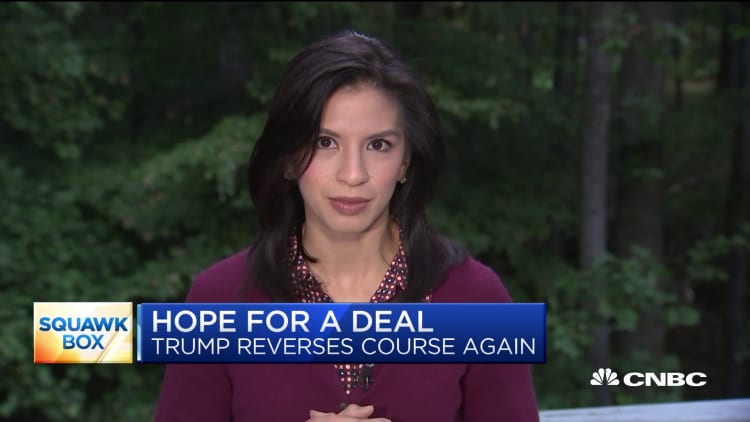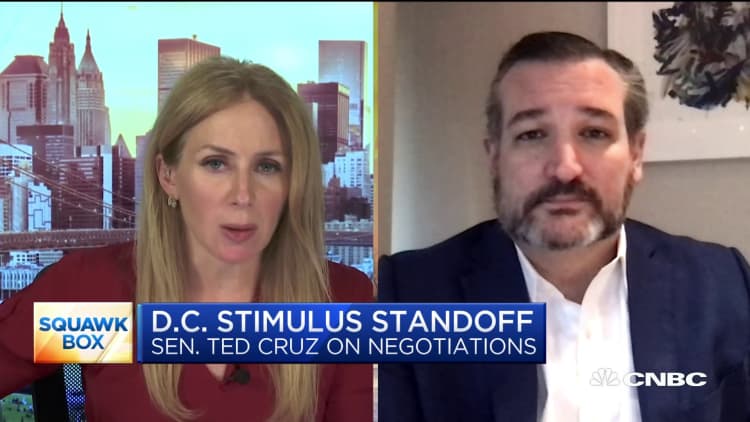Millions of Americans have been waiting for Congress to pass another stimulus package that would deliver them financial relief during one of the steepest downturns in history.
They're still waiting.
The delay hasn't been helped by Capitol Hill's mixed messages. Earlier this week, President Donald Trump said that he was postponing stimulus bill negotiations until after the election, only to reverse his stance a few days later, saying that talks over another package had turned "very productive."
Frustrated by the conflicting news? Here's where relief measures stand.
Unemployment benefits
After the $600 federal unemployment checks came to an end in July, the president took executive action in August to give many jobless Americans an extra $300-a-week boost for up to six weeks.
Yet some states have already run out of that extra money, and South Dakota never applied for the funds, even while tens of millions of Americans remain unemployed.
More from Personal Finance:
Here's how to get more financial aid
College students are worried about their financial future
Pandemic sends young adults back to mom and dad
Without news on another federal boost, most jobless Americans will continue to get state unemployment benefits. The average state pays out around $300 a week. Yet the minimum benefits in each state leave some people in even more dire situations. For example, jobless workers in Hawaii can get as little as $5 a week, or just $15 in Connecticut.
Thanks to the first stimulus package, most workers will be able to collect these payments for 39 weeks, or even longer in some cases.
Stimulus checks
House Democrats introduced new legislation last month that would include another round of $1,200 stimulus checks.
Most recently, the president called on Congress to approve the direct payments.
However, experts say that Democrats may be hesitant to send out checks with Trump's name on it right before the election.
Still, the effort has had bipartisan support all along.
Evictions are banned for now
As millions of Americans grapple with a loss of income and difficultly paying their bills, most should at least be protected from eviction until the end of the year.
That's because earlier this month, the CDC made it illegal for landlords across the U.S. to evict tenants who can't afford to pay their rent.

One important caveat: Renters will need to sign a declaration form and give it to their landlords to make sure they're protected. And to qualify, individuals have to expect to earn less than $99,000 a year in 2020 and couples, under $198,000.
Worrying advocates is the fact that some states seem to be adopting a more narrow application of the CDC ban.
For example, the CDC doesn't say anything about renters needing to provide documentation to prove that they qualify for the protection aside from the declaration form but, in Maryland, evidence may be required.
And in Michigan, it's up to a judge's interpretation of what stages of an eviction the CDC's ban should apply to.
Experts say renters worried about eviction should seek legal help in their area. You can do so at Lawhelp.org.
Tax cuts
It's been more than a month since Trump's order for a temporary cut to payroll taxes went into effect. The suspension of the 6.2% tax employees pay toward Social Security will last until the end of the year, and applies to workers who earn no more than $4,000 per biweekly pay period.
But many employers will likely not give their workers' larger paychecks and just continue to withhold the levies for when and if they're eventually due to the government.
A break from student loans
Trump's executive order also granted people with federal student loans a pause from their bills until January, during which interest will not accrue. There have been some questions over whether such a move is constitutional, but the U.S. Department of Education has now announced that it will fully implement the president's memorandum.
The payment break through Dec. 31, 2020, is automatic. If your loans qualify for the reprieve, you shouldn't have to request it with your servicer, unlike the Education Department's usual forbearances and deferments.
Meanwhile, higher education Mark Kantrowitz said he's optimistic that the payment pause will pushed out until Sep. 2021.
With relief measures in limbo, how are you and your family faring financially? If you're willing to share your story, please email me at annie.nova@nbucni.com



